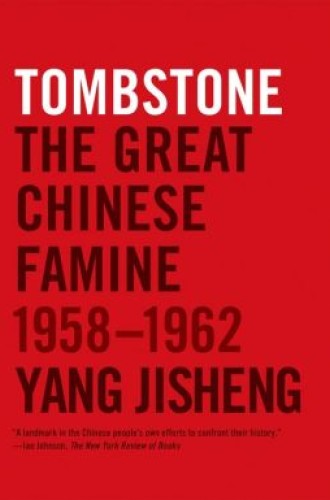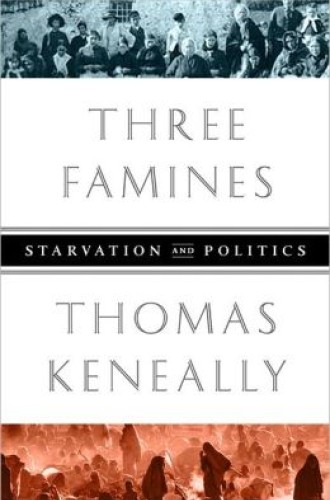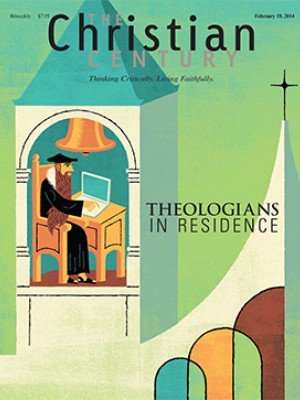Tombstone, by Yang Jisheng, and Three Famines, by Thomas Keneally
During China’s Great Famine (1958 to 1962), Yang Jisheng was called home to his rural town by a friend. The budding writer discovered his father starving to death. Destitute and immobilized, without a single grain of rice, he could not even fetch water and did not have the strength to strip bark from the trees for food. He was “starved beyond helping himself.” And Yang’s father was not alone. Famine was widespread, and it had transformed the countryside. Trees had been stripped of bark and ponds had been drained for the sake of the foul-tasting mollusks—a food which had never before been eaten.
Searing memories of that experience and his father’s eventual death spurred Yang, a Communist Party member and former reporter for the official Xinhua news agency, to begin his investigation and documentation. “I did erect a tombstone for my father, in my heart, and this book is made of the words I carved into that tombstone,” Yang explains.
Read our latest issue or browse back issues.
A massive work, Tombstone is the result of two decades of reporting, gathering documents and interviewing survivors. Part history and part document dump, Yang’s study is repetitive and dense, and it fails to supply enough context for non-Chinese readers. Yet the imperfections in Tombstone almost add to its power. The accumulation of case-by-case documentation reveals a country that lost its bearings.
How is it possible to grasp the reality of 36 million people starving to death?
Mao Zedong’s Great Leap Forward, an industrialization campaign intended to put China ahead of the West, led to disasters. These included agricultural experiments that did not work; crackdowns ensuring that all grains were sent to government-run warehouses for use elsewhere (households were routinely inspected for even the slightest kernels of grain); and the introduction of communal kitchens where Communist Party cadres fed people en masse. (As part of the overall absurdity, authorities even confiscated private kitchen utensils and had them melted down into scraps of unused pig iron.)
Yang argues that a combination of ideological fervor, government indifference and political hubris mingled in a toxic brew. “Control was virtually total. Political power extended into the most remote corners of China’s map and allowed the dictatorship of the proletariat to invade every family, every brain, and every stomach.”
The Great Famine occurred within a system that produced incentives for local officials to exaggerate production while the state monopoly stifled incentives for increasing production. The monopoly also deprived peasants of their right to obtain food and made them dependent on the government for every meal, while punishing them for applying individual effort in food production.
The resulting “situation on the ground,” to use humanitarian parlance, was desperate beyond words. People survived through acts of cannibalism (sometimes exhuming dead bodies in search of food). “Survival,” writes Yang, “takes precedence over all else, and animal nature overtakes human nature. Human beings at the extreme of hunger pay no regard to affection, morality, or dignity.” Yang argues that while totalitarianism “does not inevitably result in disasters on such a massive scale,” totalitarian states tend to develop policies in a vacuum and find it difficult to change course.
Thomas Keneally would agree. The Australian writer, author of the biography of Oskar Schindler that was the basis for the film Schindler’s List, has written a primer on the history of famine. Three Famines examines the famine in Ireland in the 1840s, in Bengal (now Bangladesh) a century later, and in Ethiopia in the 1970s and 1980s. He argues that famine in all three locales occurred “not because of the loss of a single staple food, or because of natural disasters—drought or plant pestilence—in themselves,” but as the result of a lethal combination of neglect, mismanagement and incompetence. In Ireland and Bengal, the fault lay with British colonial overseers; in Ethiopia, with a harsh Marxist government headed by Mengistu Haile Mariam.
Racial, religious and ethnic prejudice were also factors. The case of Ireland is well known, yet it remains shocking to read how some British officials felt God’s hand was at work when thousands perished. Keneally quotes the British bureaucrat Charles Trevelyan, who coolly asserted in 1847 that “it is hard upon the poor people that they should be deprived of knowing that they are suffering from an affliction of God’s providence” because of the “moral evil of the selfish, perverse and turbulent character of the people.”
Outright cruelty was also in evidence. Keneally notes that British troops needlessly evicted thousands of Irish from their homes, all while guarding foodstuffs meant for export. (A similar situation existed in China during its Great Famine, when the country continued to export food at record levels.) In the 1980s, government troops in Ethiopia, trying to quash an antigovernment rebellion, destroyed whole villages and purposely impeded food supplies from getting to displaced persons. One displaced person said, “There was no hunger before this,” and the point was well taken. The victims in Ethiopia, Ireland and Bengal “felt with some accuracy that the land itself produced enough food,” Keneally writes. “It was the fact that the food became inaccessible to millions that produced the emergency.”
Keneally’s book feels rushed, and it is not helped by his decision to cut back and forth between the three regional histories. As a result, the book loses narrative power and propulsion, and the Bengal history in particular loses focus. And yet there may not be a better single introduction to the issue of famine for the general reader, especially in the way it reveals some of the problems caused by the modern-day aid machine.
That aid machine has saved lives and will continue to do so. But even humanitarians acknowledge that the aid business—with its growing dependence on simple, media-driven messaging—has caused problems of its own. In the case of Ethiopia, Keneally recounts, aid agencies sold the emergency as a drought. Their efforts famously led to “Live Aid” events and the recording of the hit single “We Are the World.”
But the relief effort downplayed crucial political realities in Ethiopia. “Should a relief agency feed some of the people while fully knowing that food will be diverted and that their intended mercy will not be extended to troublesome regions, people or unpopular tribes?” The public, Keneally notes, believed that the hunger in Ethiopia was due to drought and drought alone. “People did not understand that between their donations and the starving lay the intransigence of Mengistu, as well as the corrupt dealings of some Ethiopian officials, which led to some food aid being put up for sale in local markets.”
Such realities are frustrating to those who work in the aid business, as well as those who write checks to groups such as Church World Service, Lutheran World Relief and Bread for the World. When we support hunger relief, we hope it is possible to restore human dignity to those in need, however imperfectly or incrementally. Often it is. But aid programs falter when it is governments that are starving people—sometimes in the name of ideology. Since humanitarian groups nearly always have to work with governments, there is often little that can be done to get around the problem.
Tang and Keneally squarely face these uncomfortable facts in works that are as unwieldy and untidy as their subject. Despite their imperfections, they lay bare histories that deserve attention. They remind us of both famine’s human costs and its roots in political systems that display arrogance, hubris and neglect.








